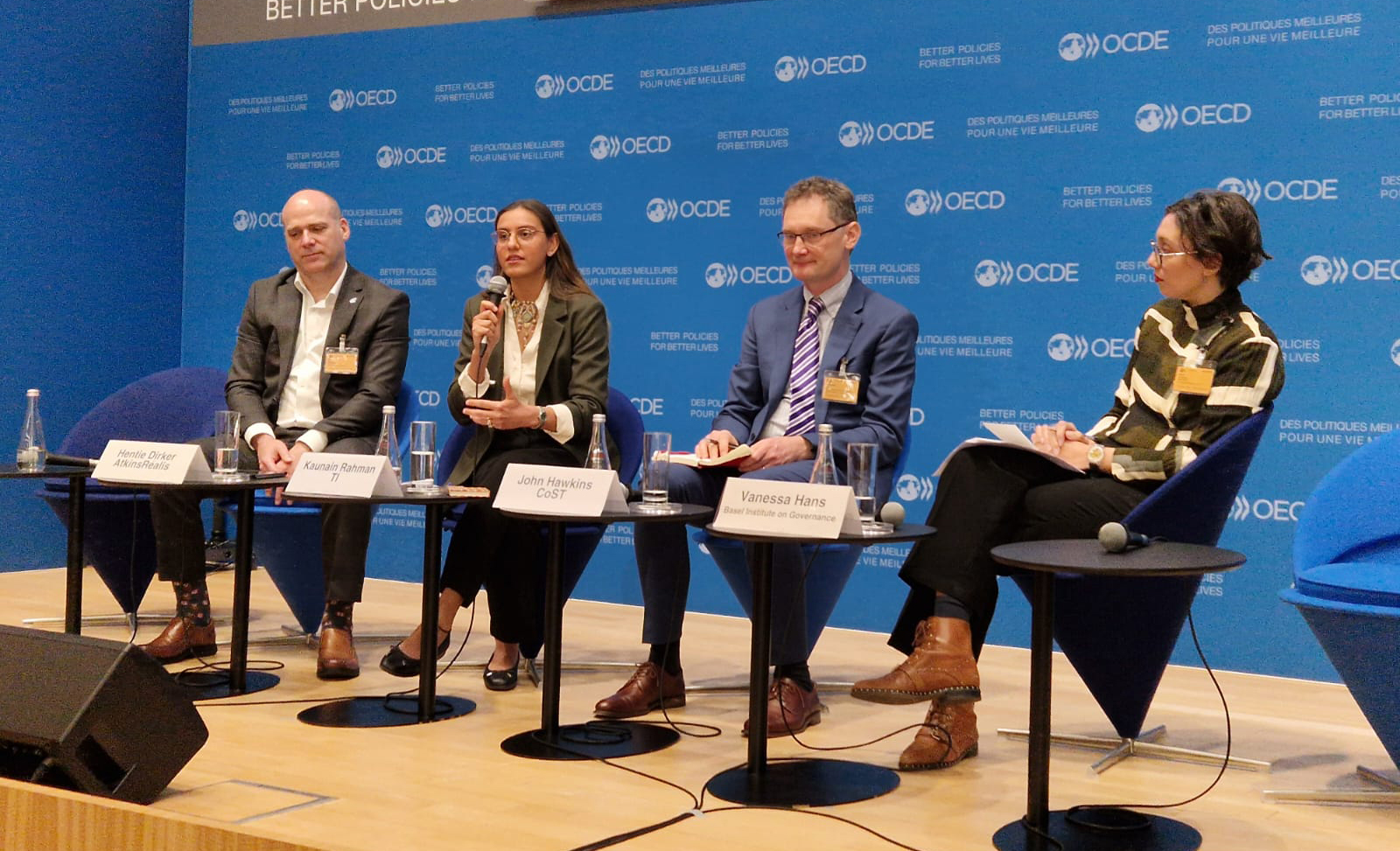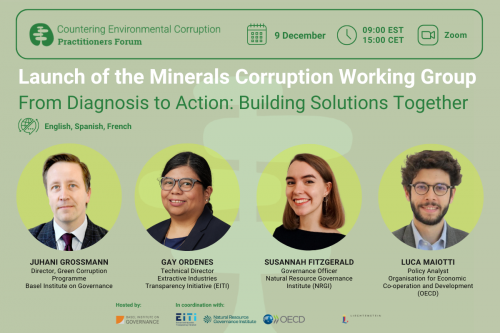Paris, Vilnius, Basel: Business integrity goes on tour

Paris is known as the city of love. But once a year, during the OECD Global Anti-Corruption Forum (GACIF), it also becomes the beating heart of integrity – at least for the anti-corruption community.
Under the theme “Designing our future with integrity”, this year’s Forum brought together anti-corruption experts from business, government and civil society from around the world to explore trends in the fight for integrity and against corruption.
Amid the global upheavals of the past year, how did this year’s Forum differ from previous editions? And how is the private sector adapting to these evolutions? A few takeaways from our Private Sector team are below.
1 – Celebrating the OECD Convention’s relevance for business
2024 marked the 25th anniversary of the OECD Anti-Bribery Convention, which recognises Collective Action as a best practice through its complementary 2021 Recommendation.
In the presence of the French and Ukrainian Ministers of Justice, the Convention’s anniversary provided impetus to reflect on its many notable successes, as well as the challenges ahead. Discussions recalled the unprecedented importance and relevance of the Convention in ensuring equitable and sustainable global trade.
2 – Major evolutions in integrity and compliance
This GACIF also saw the launch of the OECD Anti-Corruption and Integrity Outlook, which assesses the effectiveness of Member States’ integrity efforts, and highlights key developments and trends in anti-corruption. These include the emerging risks in the energy transition, the increasing use of technology in corruption schemes and the growing threats of foreign interference.
Speakers discussed the evolving functions of compliance officers and the need to strengthen their role. A key message was the need for compliance roles to evolve from operational to strategic positions within companies.
3 – Participation in shaping business integrity
Multiple global crises are impacting the way business is done internationally, reinforcing the role companies play in global anti-corruption efforts. As a result, this year’s GACIF saw a strong private-sector presence, both in terms of attendance and topics discussed.
We already saw this trend at the last major anti-corruption event in December 2023 – the 10th session of the Conference of the States Parties (CoSP) to the United Nations Convention against Corruption (UNCAC) – where the private sector showed a strong appetite to participate in shaping the global business integrity agenda.
4 – Collective Action is crucial for integrity and fair competition
The increased business presence at this year’s GACIF meant that Collective Action was at the centre of many discussions. It was consistently presented as a crucial tool to raise standards of business integrity and level the playing field. The Basel Institute’s session (as a GACIF Knowledge Partner) on enhancing transparency in the critical infrastructure sector highlighted that:
● Collective Action allows for tailored solutions for each industry. This is demonstrated by the World Economic Forum's Partnering Against Corruption Initiative (PACI), whose approach acknowledges that corruption-related challenges differ across industries.
● Integrity Pacts can provide strong incentives for business integrity and create a learning platform for smaller actors in the infrastructure sector to improve their compliance capacity.
● Initiatives such as CoST – the Infrastructure Transparency Initiative are driving long-term policy reform and providing evidence for better decision making, leading to higher-quality infrastructure.
5 – Leaders call for harmonised standards
Public-private cooperation was a focus of the OECD’s Anti-Corruption Leaders Hub annual meeting at the forum. This multi-stakeholder community of chief compliance officers and integrity leaders from government and civil society facilitates dialogue on pressing challenges and opportunities.
In one of her last public events before her tragic passing on 6 April 2024, Gretta Fenner, the Basel Institute’s Managing Director, moderated a roundtable discussion on bridging the implementation gap between international anti-corruption standards and national policies.
Private-sector participants shared how they are responding to the practical challenges of operating globally under misaligned standards, and called on governments to harmonise expectations of businesses.
6 – Opportunities for peer learning and dialogue
In a session on innovative peer learning programmes, Vanessa Hans, Head of the Basel Institute’s Private Sector team, highlighted the importance of creating safe spaces for open communication and constructive criticism when dealing with sensitive topics such as corruption.
There are many opportunities for anti-corruption and compliance professionals to exchange with each other in a neutral, mutually supportive way. These include dedicated Collective Action initiatives that focus on peer learning and jointly raising standards, such as the Wolfsberg Group, Metals Technology Initiative or many of the other initiatives included in our global database.
An interesting current programme for compliance officers initiated by the OECD and Basel Institute on Governance is Compliance without Borders. The programme matches compliance professionals from private companies and state-owned enterprises to exchange experiences, build expertise and discover new anti-corruption systems, techniques and solutions.
What’s next? Business integrity is touring Europe
After Paris, lovers of business integrity are heading east, to Vilnius, Lithuania, before ending their tour in Basel, Switzerland.
Transparency International’s flagship International Anti-Corruption Conference (IACC) will come to Vilnius from 18 to 21 June 2024 with a dedicated track on “Building a Global Ethical Economy: Advancing Business Integrity and Its Leaders”.
A week later, the Basel Institute will convene the global Collective Action community for its 5th International Collective Action Conference. The in-person event will showcase Collective Action as a holistic approach to fighting and preventing corruption, and highlight the Basel Institute’s role in building a global community of practice for Collective Action. The draft agenda is available here. Our annual Anti-Corruption Collective Action Awards will also be presented at the conference – keep an eye out for the public vote here.



